- Home
- Harlan Ellison
Troublemakers: Stories by Harlan Ellison Page 7
Troublemakers: Stories by Harlan Ellison Read online
Page 7
That soldier shoved the body aside carelessly, thinking of his four children, lost to him forever in a Ruskie-Chink raid on Garmatopolis, sent to the bogs to work. His mind conjured up the sight of the three girls and the little boy with such long, long eyelashes–each dragging through the stinking bog, a mineral bag tied to the neck, collecting fuel rocks for the enemy. He began to cry softly. The sound and mental image of crying was picked up by a Ruskie-Chink telepath somewhere across the lines, and even before the man could catch himself, blank his mind, the telepath was on him.
The soldier raised up from the firmhole bottom, clutching with crooked hands at his head. He began to tear at his features wildly, screaming high and piercing, as the enemy telepath burned away his brain. In a moment his eyes were empty, staring shells, and the man flopped down beside his comrade, who had begun to deteriorate.
A thirty-eight thread whined its beam overhead, and the eight remaining men saw a munitions wheel go up with a deafening roar. Hot shrapnel zoomed across the field, and a thin, brittle, knife-edged bit of plasteel arced over the edge of the firmhole, and buried itself in one soldier’s head. The piece went in crookedly, through his left earlobe, and came out skewering his tongue, half-extended from his open mouth. From the side it looked as though he were wearing some sort of earring. He died in spasms, and it took an awfully long while. Finally, the twitching and gulping got so bad, one of his comrades used the butt of a Brandelmeier across the dying man’s nose. It splintered the nose, sent bone chips into the brain, killing the man instantly.
Then the attack call came!
In each of their heads, the telepathic cry came to advance, and they were up out of the firmhole, all seven of them, reciting their daily prayer, and knowing it would do no good. They advanced across the slushy ground, and overhead they could hear the buzz of leech bombs, coming down on the enemy’s thread emplacements.
All around them in the deep-set night, the varicolored explosions popped and sugged, expanding in all directions like fireworks, then dimming the scene, again the blackness.
One of the soldiers caught a beam across the belly, and he was thrown sidewise for ten feet, to land in a soggy heap, his stomach split open, the organs glowing and pulsing wetly from the charge of the threader. A head popped out of a firmhole before them, and three of the remaining six fired simultaneously. The enemy was a booby–rigged to back-track their kill urge, rigged to a telepathic hookup–and even as the body exploded under their combined firepower, each of the men caught fire. Flames leaped from their mouths, from their pores, from the instantly charred spaces where their eyes had been. A pyrotic-telepath had been at work.
The remaining three split and cut away, realizing they might be thinking, might be giving themselves away. That was the horror of being just a dog-soldier, not a special telepath behind the lines. Out here all the options totaled nothing but death.
A doggie-mine slithered across the ground, entwined itself in the legs of one soldier, and blew his legs out from under him. He lay there clutching the shredded stumps, feeling the blood soaking into the mud, and then unconsciousness seeped into his brain. He died shortly thereafter.
Of the two left, one leaped a barbwall and blasted out a thirty-eight thread emplacement of twelve men, at the cost of the top of his head. He was left alive, and curiously, as though the war had stopped, he felt the top of himself, and his fingers pressed lightly against convoluted, slick matter for a second before he dropped to the ground.
His braincase was open, glowed strangely in the night, but no one saw it.
The last soldier dove under a beam that zzzzzzzed through the night and landed on his elbows. He rolled with the tumble, felt the edge of a leech-bomb crater, and dove in headfirst. The beam split up his passage, and he escaped charring by an inch. He lay in the hole, feeling the cold of the battlefield seeping around him, and drew his cloak closer.
The soldier was Qarlo…
He finished talking, and sat down on the platform…
The audience was silent…
Sims shrugged into his coat, fished around in the pocket for the cold pipe. The dottle had fallen out of the bowl, and he felt the dark grains at the bottom of the pocket. The audience was filing out slowly, hardly anyone speaking, but each staring at others around him. As though they were suddenly realizing what had happened to them, as though they were looking for a solution.
Sims passed such a solution. The petitions were there, tacked up alongside the big sign–duplicate of the ones up all over the city. He caught the heavy black type on them as he passed through the auditorium’s vestibule:
SIGN THIS PETITION!
PREVENT WHAT YOU HAVE HEARD TONIGHT!
People were flocking around the petitions, but Sims knew it was only a token gesture at this point: the legislation had gone through that morning. No more war…under any conditions. And intelligence reported the long playing records, the piped broadcasts, the p.a. trucks, had all done their jobs. Similar legislation was going through all over the world.
It looked as though Qarlo had done it, single-handed.
Sims stopped to refill his pipe, and stared up at the big black-lined poster near the door.
HEAR QARLO, THE SOLDIER FROM THE FUTURE!
SEE THE MAN FROM TOMORROW, AND HEAR HIS STORIES OF THE WONDERFUL WORLD OF THE FUTURE!
FREE! NO OBLIGATIONS! HURRY!
The advertising had been effective, and it was a fine campaign.
Qarlo had been more valuable just telling about his Wars, about how men died in that day in the future, than he could ever have been as a strategist.
It took a real soldier, who hated war, to talk of it, to show people that it was ugly, and unglamorous. And there was a certain sense of foul defeat, of hopelessness, in knowing the future was the way Qarlo described it. It made you want to stop the flow of Time, say, “No. The future will not be like this! We will abolish war!”
Certainly enough steps in the right direction had been taken. The legislation was there, and those who had held back, who had tried to keep animosity alive, were being disposed of every day.
Qarlo had done his work well.
There was just one thing bothering special advisor Lyle Sims. The soldier had come back in time, so he was here. That much they knew for certain.
But a nagging worry ate at Sims’s mind, made him say prayers he had thought himself incapable of inventing. Made him fight to get Qarlo heard by everyone…
Could the future be changed?
Or was it inevitable?
Would the world Qarlo left inevitably appear?
Would all their work be for nothing?
It couldn’t be! It dare not be!
He walked back inside, got in line to sign the petitions again, though it was his fiftieth time.
RAIN, RAIN, GO AWAY
I had this pal when I was about fifteen or so, I’ll call him Dandy, even though that wasn’t his name. He’s still around, and I see no reason to disrespect him, but I want to use him as the example of the troublemaker lesson embodied in the story that follows…an admittedly silly little story I wrote early in my career. Dandy was talented. He was whip-smart, and goodlooking and could talk to girls and adults with ease. He was the front-man for our bunch of weird geekazoids, because he got along with the basketball team and the social slicks and the cops, even. But he was one of us, because he liked to read, and he had a talent for writing, and he understood science and math and all like that, sort of an all-around Renaissance High School kid. So we all thought he was going to be the one who became famous and rich and had the best-looking girls. (Remember, I was the one who was gonna wind up in the gutter or jail.) And soon after we all graduated high school, Dandy wrote this story that got published in one of the most prestigious magazines of the time, he got a book contract, he got a full scholarship to an atomic energy university, and he was courted and inducted into a top-line fraternity. And the book never got published, he bombed out of school, he drank too much, and he wo
und up writing copy for some mail order catalogue. Spent a decade or so wandering around, and last time I heard of him he’d managed to find a happy berth, and was enjoying life. But now he’s approaching seventy, and there was a lot of potential and grandeur that never got to show itself. He procrastinated. He put off till a decade later, that which he should’ve done today. Rain, rain, go away, come again…
Sometimes I wish I were a duck, mused Hobert Krouse.
Standing in front of his desk, looking out the window at the amount of water the black sky had begun to let flow, his thoughts rolled in the same trough made for them years before.
“Rain, rain, go away, come again another…” he began, sotto voce.
“Krouse! Come away from that window and get back to those weather analyses, man, or you’ll be out walking in that, instead of just looking at it!” The voice had a sandpaper edge, and it rasped across Hobert’s senses in much the same way real sandpaper might. Hobert gasped involuntarily and turned. Mr. Beigen stood, florid and annoyed, framed in the big walnut timbers of the entrance to his office.
“I–I was just looking at the rain, sir. You see, my predictions were correct. It is going to be a prolonged wet spell…” Hobert began, obsequiously sliding back into his swivel chair.
“Balderdash, man,” Mr. Beigen roared. “Nothing of the sort! I’ve told you time and again, Krouse, leave the predictions to the men who are paid for that sort of thing. You just tend to your checking, and leave the brainwork to men who have the equipment. Prolonged rain, indeed! All my reports say fair.
“And let’s have that be the last time we see you at something other than your job during work hours, Krouse. Which are eight-thirty to five, six days a week,” he added.
With a quick glance across the rest of the office, immobilizing every person there with its rockiness, Beigen went back into his office, the door slamming shut with finality.
Hobert thought he caught a fragment of a sentence, just as the door banged closed. It sounded like “Idiot,” but he couldn’t be sure.
Hobert did not like the tone Mr. Beigen had used in saying it was the last time he wanted to see him away from his desk. It sounded more like a promise than a demand.
The steady pound of the rain on the window behind him made him purse his lips in annoyance. Even though his job was only checking the weather predictions sent down from the offices upstairs against the messages sent out by the teletype girls, still he had been around the offices of Havelock, Beigen and Elsesser long enough to take a crack at predicting himself.
Even though Mr. Beigen was the biggest man in the wholesale farm supply business, and Hobert was one small link in a chain employing many hundreds of people, still he didn’t have to scream that way, did he? Hobert worried for a full three minutes, until he realized that the stack of invoices had been augmented by yet another pile from the Gloversville, Los Angeles and Topeka teletypes. He began furiously trying to catch up. Something which he would never quite be able to do.
Walking home in the rain, his collar turned up, his bowler pulled down tight over his ears, the tips of his shoes beginning to lose their shine from the water, Hobert’s thoughts began to take on a consistency much like the angry sky above him.
Eight years in the offices of Havelock, Beigen and Elsesser had done nothing for him but put sixty-eight dollars and fifty-five cents into his hand each week. The work was an idiot’s chore, and though Hobert had never finished college, still it was a job far beneath his capabilities.
Hobert’s section of the firm was one of those little services rendered to farmers within the reach of the company’s services. A long-range weather forecast for all parts of the country, sent free each week to thousands of subscribers.
A crack of thunder split Hobert’s musings, forcing him to a further awareness of the foul weather. Rain had soaked him from hat crown to shoe soles and even gotten in through his upturned collar, to run down his back in chilly threads. He began to wish there might be someone waiting at home for him with the newspaper (the one he had bought at the corner was now a sodden mass) and his slippers, but he knew there would not be.
Hobert had never married–he had just not found the girl he told himself must come to him. In fact, the last affair he could recall having had was five years before, when he had gone up to Bear Mountain for two weeks. She had been a Western Union telegraph operator named Alice, with very silky chestnut hair, and for a while Hobert had thought perhaps. But he had gone back to New York and she had gone back to Trenton, New Jersey, without even a formal good-bye, and Hobert despaired of ever finding The One.
He walked down West 52nd to Seventh Avenue, scuffing his feet in irritation at the puddles which placed themselves so he could not fail to walk through them, soaking his socks. At 50th he boarded the subway uptown and all the way sat brooding.
Who does Beigen think he is, Hobert seethed within himself. I’ve been in that office eight years, three months and…well, I’ve been there well over eight years, three months. Who does he think he’s pushing around like that? I may be a little smaller, but I’ll be (his mind fortified itself) damned (his mind looked around in embarrassment to see if anyone had noticed) if I’ll take treatment like that. I’ll–I’ll quit, that’s what I’ll do. I’ll quit. Then where will he be? Who’ll he get to fill my job as capably as I can?
But even as he said it, he could see the ad in the Herald-Tribune the night he would resign:
OFFICE Boy-clk, 18–20 exc. future $40 no exp. nec. Havelock, Beigen & Elsesser 229 W 52.
He could see it so clearly in his mind because that had been the ad to which he had replied, eight years, three months and an undetermined number of weeks before. The horror of it all was compounded by the fact that he couldn’t even answer the ad now. He was no longer 18–20. He was caroming toward 50.
The mindless roar of the train hurtling through the subway dimmed for Hobert and, as happens to everyone occasionally, everything summed up for him. The eight years summed up. His life summed up.
“I’m a failure.” He said it aloud, and heads turned toward him, but he didn’t notice. He said it again in his mind, clearer this time, for it was true and he knew it: I’m a failure.
I’ve never been to Puerto Rico or India or even to Trenton, New Jersey, he thought. The farthest away from this city I’ve been is Bear Mountain, and that was only for two weeks. I’ve never really loved anyone–except Mother, he hastened to add; and she’s been gone thirteen years now–and no one has ever really loved me.
When the line of thoughts had run itself out, Hobert looked up, misty-eyed, and saw that he had gone past his station. He got off, walked over and took the downtown train back to West 110th.
In his room, cramped by books and periodicals so that free space was nearly non-existent, Hobert removed his wet hat and coat, hung them near the radiator, and sat down on the bed, which served as a couch. I wish something truly unusual would happen to me, thought Hobert. I wish something so spectacular would happen that everyone would turn as I went down the street, and say, “There goes Hobert Krouse; what a man!” And they would have awe and wonder in their eyes. I wish it would happen to me just once. “Every man is entitled to fame at least once in his lifetime!” He said it with force, for he believed it. But nothing happened, and Hobert went to bed that night with the wind howling through the space between the apartment buildings and with the rain beating against his window.
Perhaps it will wash some of that dirt off the outside, he mused, thinking of the window that had not been clean since he had moved in. But then, it was five floors up and the custodian wouldn’t hire a window-washer and it was too dangerous out there for Hobert to do it. Sleep began to press down on him, the sure feel of it washing away his worries of the day. Almost as an incantation he repeated the phrase he had remembered from his childhood, the phrase he had murmured thousands of times since. “Rain, rain, go away, come again another day.” He began the phrase again, but sleep cut it off in mid-thought.
<
br /> It rained all that week, and by Sunday morning, when Hobert emerged from the brownstone face of his building, the ground around the one lone tree growing slantwise on the sloping sidewalk of W. 110th Street was mushy and runny. The gutters were swollen with flowing torrents. Hobert looked up at the darkened sky which was angry even at eleven in the morning, with no trace of sun.
In annoyance he ran through the “Rain, rain, go away,” nonsense and trudged up the hill to the corner of Broadway for breakfast.
In the little restaurant, his spread-bottom drooping over a stool too small for his pear shape, Hobert gave huge traditional leers to Florence, the redhead behind the counter, and ordered the usual: “Two up, ham steak, coffee, cream, Florence.”
As he ate his eggs, Hobert returned again to his wistful dreams of a few evenings previous.
“Florence,” he said, “you ever wish something spectacular would happen to you?” He pushed a mouthful of toast and ham around his tongue to get the sentence out.
Florence looked up from her duty; putting rock-hard butter squares on paper pads. “Yeah, I useta wish somethin’d happen ta me.” She pushed a string of red hair back into place. “But it never did.” She shrugged.
“Like what did you wish?” inquired Hobert.
“Oh, you know. Silly stuff, like whyn’t Mahlon Brando come in here an’ grab me an’ like that. Or whyn’t I win a millyun bucks in the Irish Sweepstakes and come back here some aftuhnoon wearin’ a mink stole and flip the end of it in that stinkin’ Erma Geller’s kisser. You know.” She went back to the butter.
Hobert knew. He had made equivalent wishes himself, with particulars slightly changed. It had been Gina Lollobrigida and a $250 silk shantung suit like Mr. Beigen owned, when he had daydreams.
He finished the eggs and ham, wiped up the last little drippings of egg yellow, bolted his coffee, and, wiping his mouth with his paper napkin, said, “Well, see you tomorrow, Florence.”

 Repent, Harlequin! Said the Ticktockman
Repent, Harlequin! Said the Ticktockman Broken Glass
Broken Glass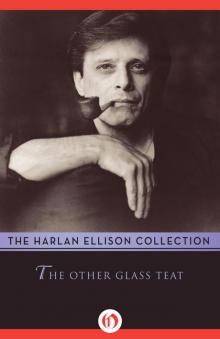 Other Glass Teat
Other Glass Teat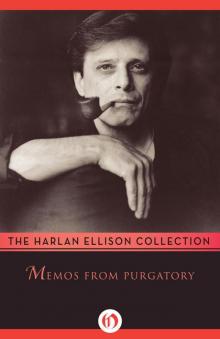 Memos From Purgatory
Memos From Purgatory I Have No Mouth and I Must Scream
I Have No Mouth and I Must Scream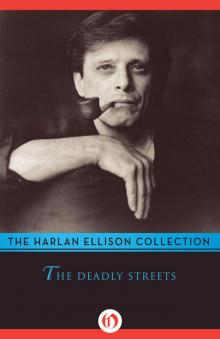 The Deadly Streets
The Deadly Streets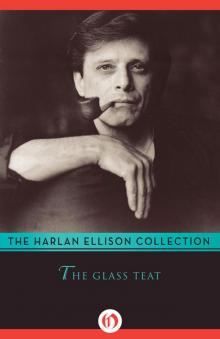 The Glass Teat
The Glass Teat Paingod and Other Delusions
Paingod and Other Delusions No Doors No Windows
No Doors No Windows Strange Wine
Strange Wine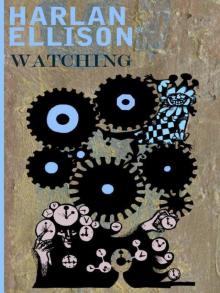 Harlan Ellison's Watching
Harlan Ellison's Watching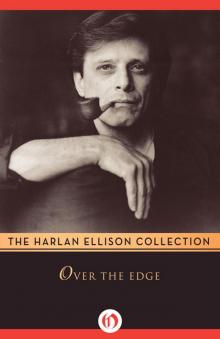 Over the Edge/An Edge in My Voice
Over the Edge/An Edge in My Voice Troublemakers: Stories by Harlan Ellison
Troublemakers: Stories by Harlan Ellison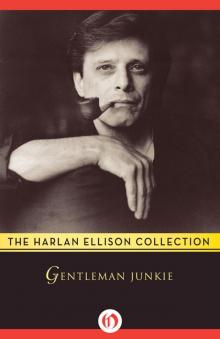 Gentleman Junkie and Other Stories of the Hung-Up Generation
Gentleman Junkie and Other Stories of the Hung-Up Generation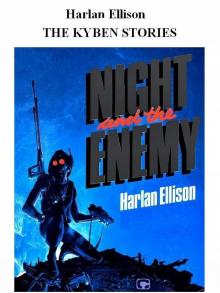 The Kyben Stories
The Kyben Stories From the Land of Fear
From the Land of Fear The Top of the Volcano: The Award-Winning Stories of Harlan Ellison
The Top of the Volcano: The Award-Winning Stories of Harlan Ellison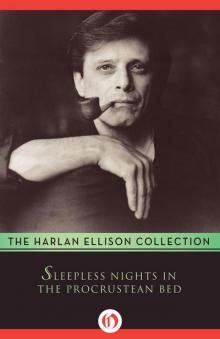 Sleepless Nights in the Procrustean Bed
Sleepless Nights in the Procrustean Bed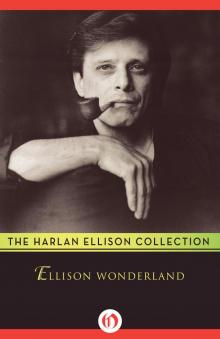 Ellison Wonderland
Ellison Wonderland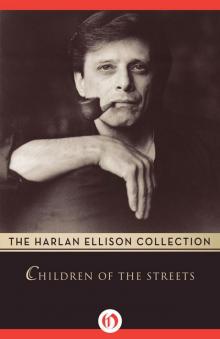 Children of the Streets
Children of the Streets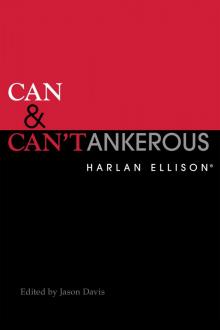 Can & Can'tankerous
Can & Can'tankerous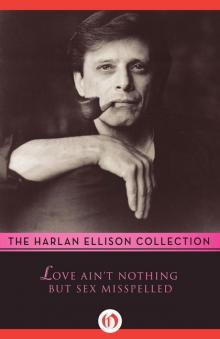 Love Ain't Nothing but Sex Misspelled
Love Ain't Nothing but Sex Misspelled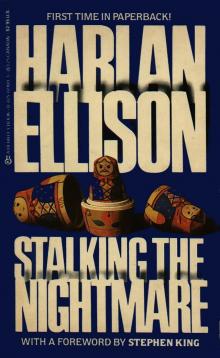 Stalking the Nightmare
Stalking the Nightmare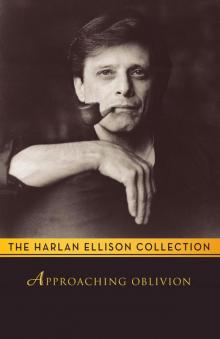 Approaching Oblivion
Approaching Oblivion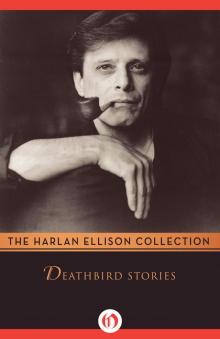 Deathbird Stories
Deathbird Stories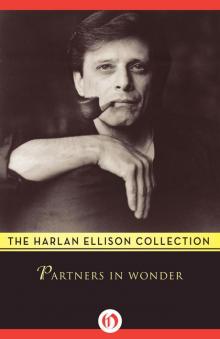 Partners in Wonder
Partners in Wonder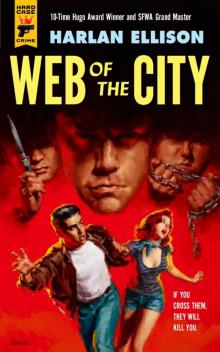 Web of the City
Web of the City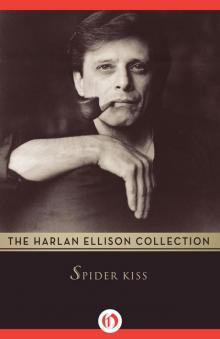 Spider Kiss
Spider Kiss A Boy and His Dog
A Boy and His Dog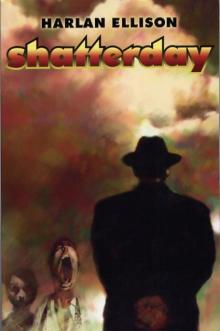 Shatterday
Shatterday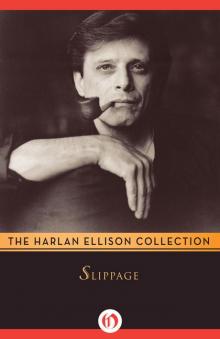 Slippage: Previously Uncollected, Precariously Poised Stories
Slippage: Previously Uncollected, Precariously Poised Stories Repent, Harlequin! Said the Ticktockman
Repent, Harlequin! Said the Ticktockman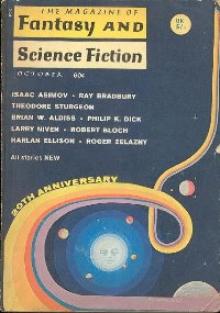 Come to Me Not in Winter's White
Come to Me Not in Winter's White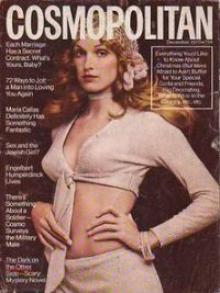 The Song the Zombie Sang
The Song the Zombie Sang The Other Glass Teat
The Other Glass Teat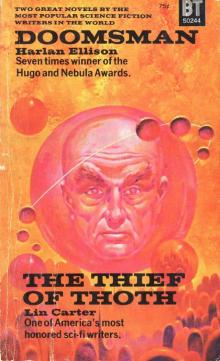 Doomsman - the Theif of Thoth
Doomsman - the Theif of Thoth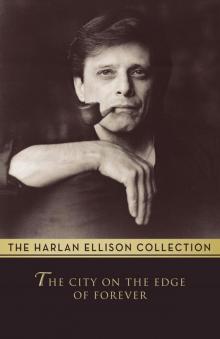 The City on the Edge of Forever
The City on the Edge of Forever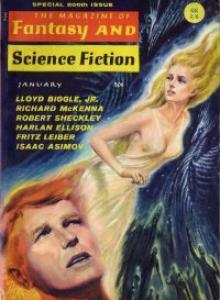 I See a Man Sitting on a Chair, and the Chair Is Biting His Leg
I See a Man Sitting on a Chair, and the Chair Is Biting His Leg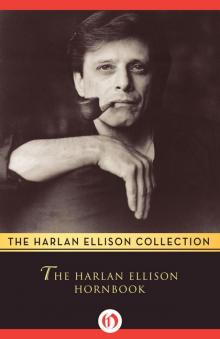 The Harlan Ellison Hornbook
The Harlan Ellison Hornbook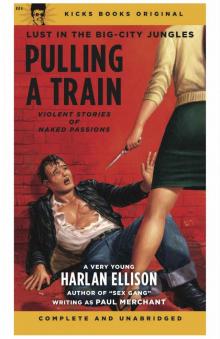 Pulling A Train
Pulling A Train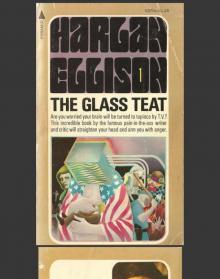 The Glass Teat - essays of opinion on the subject of television
The Glass Teat - essays of opinion on the subject of television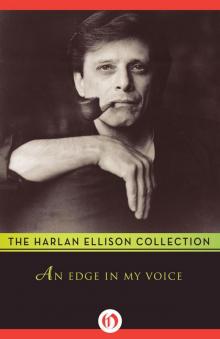 An Edge in My Voice
An Edge in My Voice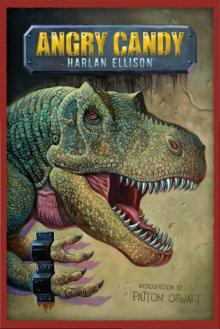 Angry Candy
Angry Candy Troublemakers
Troublemakers The Top of the Volcano
The Top of the Volcano Over the Edge
Over the Edge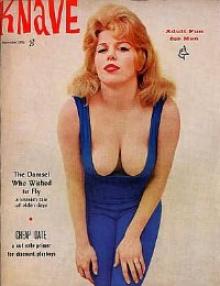 Survivor #1
Survivor #1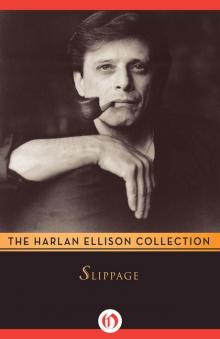 Slippage
Slippage